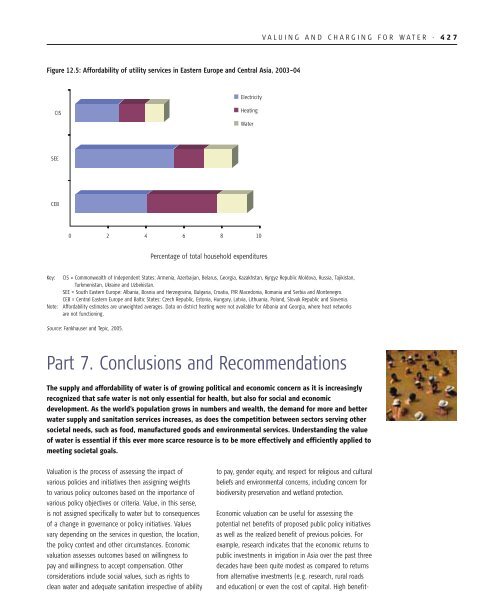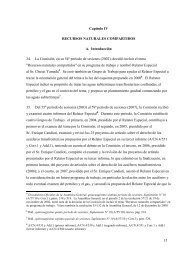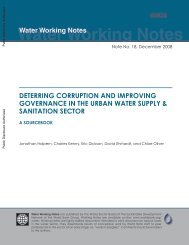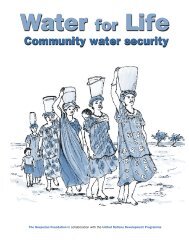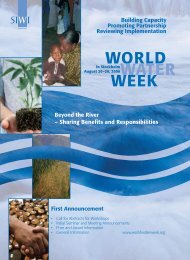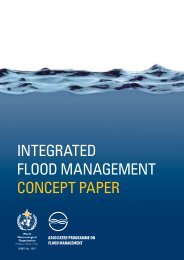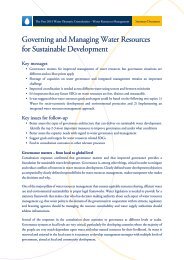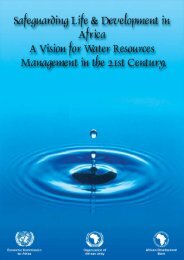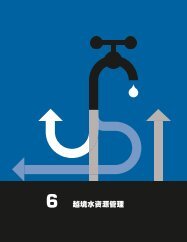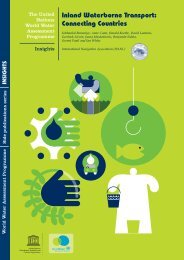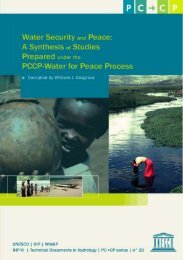Water: a shared responsibility; 2006 - UN-Water
Water: a shared responsibility; 2006 - UN-Water
Water: a shared responsibility; 2006 - UN-Water
You also want an ePaper? Increase the reach of your titles
YUMPU automatically turns print PDFs into web optimized ePapers that Google loves.
V A L U I N G A N D C H A R G I N G F O R W A T E R . 427<br />
Figure 12.5: Affordability of utility services in Eastern Europe and Central Asia, 2003–04<br />
Electricity<br />
CIS<br />
Heating<br />
<strong>Water</strong><br />
SEE<br />
CEB<br />
0 2 4 6 8 10<br />
Percentage of total household expenditures<br />
Key:<br />
Note:<br />
CIS = Commonwealth of Independent States: Armenia, Azerbaijan, Belarus, Georgia, Kazakhstan, Kyrgyz Republic Moldova, Russia, Tajikistan,<br />
Turkmenistan, Ukraine and Uzbekistan.<br />
SEE = South Eastern Europe: Albania, Bosnia and Herzegovina, Bulgaria, Croatia, FYR Macedonia, Romania and Serbia and Montenegro.<br />
CEB = Central Eastern Europe and Baltic States: Czech Republic, Estonia, Hungary, Latvia, Lithuania, Poland, Slovak Republic and Slovenia.<br />
Affordability estimates are unweighted averages. Data on district heating were not available for Albania and Georgia, where heat networks<br />
are not functioning.<br />
Source: Fankhauser and Tepic, 2005.<br />
Part 7. Conclusions and Recommendations<br />
The supply and affordability of water is of growing political and economic concern as it is increasingly<br />
recognized that safe water is not only essential for health, but also for social and economic<br />
development. As the world’s population grows in numbers and wealth, the demand for more and better<br />
water supply and sanitation services increases, as does the competition between sectors serving other<br />
societal needs, such as food, manufactured goods and environmental services. Understanding the value<br />
of water is essential if this ever more scarce resource is to be more effectively and efficiently applied to<br />
meeting societal goals.<br />
Valuation is the process of assessing the impact of<br />
various policies and initiatives then assigning weights<br />
to various policy outcomes based on the importance of<br />
various policy objectives or criteria. Value, in this sense,<br />
is not assigned specifically to water but to consequences<br />
of a change in governance or policy initiatives. Values<br />
vary depending on the services in question, the location,<br />
the policy context and other circumstances. Economic<br />
valuation assesses outcomes based on willingness to<br />
pay and willingness to accept compensation. Other<br />
considerations include social values, such as rights to<br />
clean water and adequate sanitation irrespective of ability<br />
to pay, gender equity, and respect for religious and cultural<br />
beliefs and environmental concerns, including concern for<br />
biodiversity preservation and wetland protection.<br />
Economic valuation can be useful for assessing the<br />
potential net benefits of proposed public policy initiatives<br />
as well as the realized benefit of previous policies. For<br />
example, research indicates that the economic returns to<br />
public investments in irrigation in Asia over the past three<br />
decades have been quite modest as compared to returns<br />
from alternative investments (e.g. research, rural roads<br />
and education) or even the cost of capital. High benefit-


